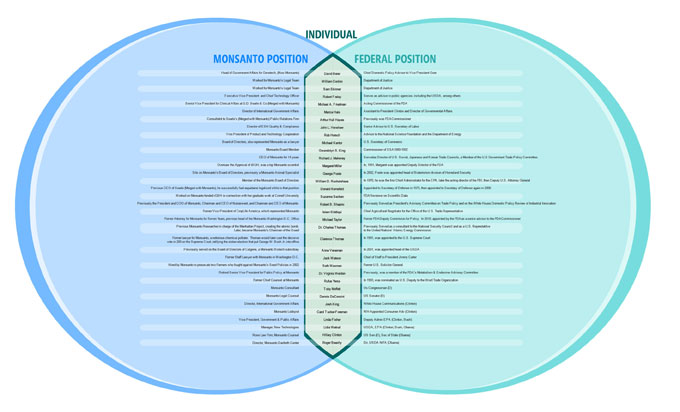When President Obama signed a spending bill into law last March, an obscure, anonymously introduced section, the Farmer Assurance Provision, outraged Americans across the political spectrum. Labeled the “Monsanto Protection Act” by critics, the rider strips the Department of Agriculture and federal courts of their powers to stop the planting of genetically engineered (GE) crops, even if they are shown to pose health risks. Monsanto’s products are already ubiquitous. The company’s patented GE soybean seeds, Roundup Ready, are grown by 93 percent of U.S. soybean farms, which must also use its accompanying herbicide, Roundup.
Monsanto, the world’s largest seed company, claims it is committed to fighting rural hunger and providing sustainable agriculture for a growing population. Supporters like Forbes Magazine, which labeled Monsanto “Company of the Year” in 2010, claim it “has been working to make humanity better fed.” Even nonprofit organizations like the Center for Science in the Public Interest have praised the benefits of GE crops, although the scientific rigor of prominent nonprofits has been questioned as their links to Monsanto have come into view.
The corporation has deep ties to the U.S. government, and it spends millions of dollars each year lobbying American politicians and advertising to defeat local efforts to label GE ingredients in food products. U.S. diplomats push the use of GE products and have sought penalties for European countries that ban Monsanto products.
In recent years, however, international resistance to Monsanto has grown. Vietnamese activists are aiming to prevent Monsanto’s entry into their country, where the company is still notorious for producing Agent Orange, a herbicide that caused severe health problems for more than a million people in the wake of the Vietnam War. In India, environmental activists blame Monsanto for the alarming rise in debt and suicide among farmers. And in Mexico, thousands of peasant farmers are protesting plans to introduce GE corn into the country.
In Argentina, the world’s third-largest producer of GE crops, a group of women calling themselves the “Mothers of Ituzaingó” are fighting against the aerial spraying of Roundup. Residents of Ituzaingó, a working-class neighborhood of Córdoba that borders commercial soy farms, have reported a cancer rate more than 40 times higher than the nationwide average.
The above video shows a recent anti-Monsanto protest in Buenos Aires led by Goldman Environmental Prize winner Sofia Gatica, who has been campaigning against the company since her daughter died of a kidney malformation days after birth. On May 25, people around the world will join her struggle in a global March Against Monsanto.
This piece, commissioned by Creative Time Reports, has also been published by Alternet.


